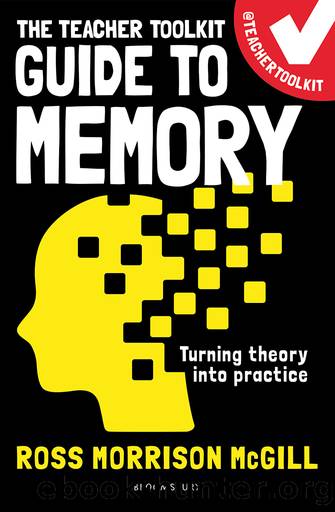The Teacher Toolkit Guide to Memory by McGill Ross Morrison;Bain Patrice;

Author:McGill, Ross Morrison;Bain, Patrice;
Language: eng
Format: epub
Publisher: Bloomsbury Publishing Plc
Published: 2022-07-15T00:00:00+00:00
EXPLAINER
A summary of Swellerâs original research
The aim of John Swellerâs 1988 research paper was to discuss whether people can learn through problem-solving, rather than by âdiscovery learningâ. Swellerâs conclusions are clear from the word go. In his opening line he states that âsome forms of problem solving interfere with learningâ. The first thing to distinguish is what Sweller defines as âlearningâ and what he means by âsome forms of problem-solvingâ.
How does Sweller define learning?
Are pupils learning how to construct an argument for a history assignment on the Battle of Britain and why Britainâs planes outclassed the Germans? Or perhaps we are learning how to construct a tower from building blocks, in pairs inside a Year 3 classroom, as we try to balance a tennis ball at the highest level? Whatever it is, learning needs to be defined. Sweller defines learning as the acquisition of domain-specific knowledge in the form of schemas. He argues that this is the main factor that distinguishes novices from experts. Whilst this definition is very high-brow and academic, for teachers, this is best redefined as our curriculum intentions and how we see the teaching of knowledge throughout the curriculum from day one until a student leaves formal education; developing schemas and strengthening this knowledge across multiple domains.
Sweller discusses one particular study (de Groot, 1966), which derives from investigations of chess matches between players who are masters versus less experienced players. This research indicated that expert players could remember larger sequences of moves.
What does Sweller mean by problem-solving?
The second critical point to emphasise is that Swellerâs original paper is focused entirely on problem-solving. He discusses several problem-solving strategies and which strategies are used by âexpertsâ and which are used by ânovicesâ.
Strategies selected by expert and novice problem-solvers were different. Novices worked backwards from the goal, often using a process Sweller refers to as âmeans-end analysisâ. This process involves solving problems one step at a time by attempting to reduce the difference between the problem and the end goal by setting subgoals. Lots of examples are provided in the original paper to elaborate on how problems can be solved (or not) using means-end analysis.
Conversely, experts âeliminated the backwards-working phaseâ. Experts âwork forward immediatelyâ because they recognise each problem from previous experience: â... cognitive structures [schemas] allow experts to accurately recall the configuration of a given problem.â (Sweller, 1988) In essence, the person solving the problem can categorise the scenario when they possess an appropriate schema, by using memorised configurations, compared to novices who may not have this prior knowledge. Experts can then apply this same schema to the scenario and solve the problem.
So which forms of problem-solving interfere with learning?
Sweller says it is commonly assumed that practising solving a large number of conventional problems is the most effective way of improving problem-solving abilities, but he argues that this is not the case. Sweller offers experimental evidence of interference between âmeans-end analysisâ and learning by schema acquisition. Means-end analysis uses heavy cognitive processing. To use means-end analysis to solve
Download
This site does not store any files on its server. We only index and link to content provided by other sites. Please contact the content providers to delete copyright contents if any and email us, we'll remove relevant links or contents immediately.
Navigation and Map Reading by K Andrew(4893)
Spare by Prince Harry The Duke of Sussex(4800)
Tuesdays with Morrie by Mitch Albom(4411)
Cracking the GRE Premium Edition with 6 Practice Tests, 2015 (Graduate School Test Preparation) by Princeton Review(4053)
Machine Learning at Scale with H2O by Gregory Keys | David Whiting(3654)
What It Really Takes to Get Into Ivy League and Other Highly Selective Colleges by Hughes Chuck(3561)
Never by Ken Follett(3545)
Goodbye Paradise(3458)
Harry Potter and the Prisoner of Azkaban (Book 3) by J. K. Rowling(3119)
Pledged by Alexandra Robbins(3051)
Kick Ass in College: Highest Rated "How to Study in College" Book | 77 Ninja Study Skills Tips and Career Strategies | Motivational for College Students: A Guerrilla Guide to College Success by Fox Gunnar(3003)
Fairy Tale by Stephen King(2961)
A Dictionary of Sociology by Unknown(2862)
Sapiens and Homo Deus by Yuval Noah Harari(2854)
Reminders of Him: A Novel by Colleen Hoover(2779)
The Social Psychology of Inequality by Unknown(2771)
Graduate Admissions Essays, Fourth Edition: Write Your Way into the Graduate School of Your Choice (Graduate Admissions Essays: Write Your Way Into the) by Asher Donald(2742)
Get into Any College by Tanabe Gen Tanabe Kelly(2634)
Zero to Make by David Lang(2633)
